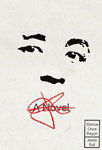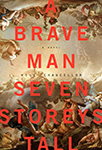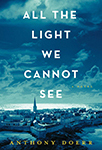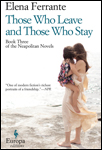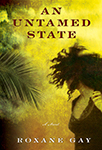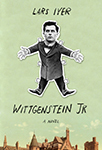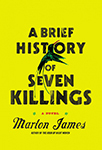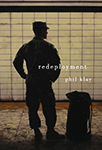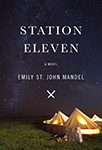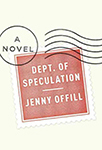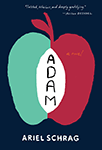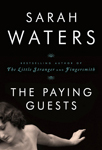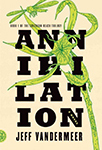by Jesse Ball
30% OFF at Powell’s »Jessica Lamb-Shapiro: From the moment I scanned the back cover of Jeff VanderMeer’s Annihilation and saw the words “Area X” and “expedition” and “the last vestiges of human civilization,” I started referring to the author in my head as Poor Jeff VanderMeer. For reasons I don’t totally understand, my nervous system tends to shut down when confronted with mysterious worlds, unfamiliar possibly supernatural elements, and the number of rules you have to remember to navigate your way through a book that might be categorized as science fiction or fantasy. By “rules” I mean this sort of thing: “If the hole glowed red, we had 30 minutes to remove ourselves to a ‘safe place.’” I am entirely aware that this is a failing on my part, and in no way a fault of the genres or their elements. So it’s really not fair to Poor Jeff VanderMeer to have someone like me judge or even comment on his book. I shouldn’t even be allowed to hold VanderMeer’s book.
That said, I was pleasantly impressed with Annihilation. VanderMeer writes with such clarity and specificity that both objects and emotions felt enlarged, as if under a microscope—appropriate, since his narrator is a biologist. For instance: “This water was so dark we could see our faces in it, and it never stirred, set like glass, reflecting the beards of gray moss that smothered the cypress trees.”
Sometimes he does this with enviable economy, like when he calls the inhabitants of a place the “tight-lipped descendants of fisherfolk.” Occasionally this hyper-attention to detail would have the opposite effect of overloading and nullifying, but for the most part the microscopic detail was delightful. This one is my favorite, a description of the inhabitants of some tidal pools the narrator had been sent to study:
Several species of marine snails and sea anemones lurked there, too, and a tough little squid I nicknamed Saint Pugnacious, eschewing its scientific name, because the danger music of its white-flashing luminescence made its mantle look like a pope’s hat.
That last clause? Amazing. Also, I have never had any feeling, good or bad, toward a fish, real or imagined, before I read this passage. But: I adore you, Saint Pugnacious.
Luckily for me, all the “rules” that were set up re Area X in the first part of the book became unnecessary to remember, and I found myself drawn in by the strange organisms and textual artifacts that made up the true landscape. The book seemed at times like a meta-commentary on my own failings to comprehend fantasy worlds:
We assumed that the structure in question was a lighthouse because the map showed a lighthouse at that location and because everyone immediately recognized what a lighthouse should look like In fact, the surveyor and the anthropologist had both expressed a kind of relief when they had seen the lighthouse. Its appearance on both the map and in reality reassured them, anchored them. Being familiar with its function further reassured them.
When my basic assumptions about what things are and how they work get messed with, I feel unhappily unmoored. Despite that, I enjoyed this book—and given that my nervous system and sci-fi have never been on good terms, that means a lot.
Away from mysterious threats in Area X, on to explicit violence in Haiti. There’s something arresting about the opening sentence of Roxane Gay’s An Untamed State that drew me in immediately:
Once upon a time, in a far-off land, I was kidnapped by a gang of fearless yet terrified young men with so much impossible hope beating inside their bodies it burned their very skin and strengthened their will right through their bones.
Part of it is the instant action, the horrifying dramatic event. But it’s also the selective way the characters are brought into focus. We are very close to the emotions of the “fearless and terrified” young men; Mireille, the narrator, more protective of herself, only gives us “I was kidnapped.”
There are many stories in this book: the story of the kidnapping, a love story, a story about two generations of Haitian immigrants in America, a story about Haiti and class and poverty, a story about what home is. All of these narratives are woven together in a way that propels the book both forward and backward, yet also conveys a sense of being out of time, trapped.
It’s very hard to communicate trauma in a way that feels nuanced but not sensationalized. Gay writes in a matter-of-fact style, simple and direct. Sentiments both surprising and entirely sensible lent a feeling of reality to the kidnapping scenes: “What you can never know about being kidnapped is the sheer boredom, the violent loneliness, the unending hours alone with nothing to do, nothing to look at, no kindness to be found.”
When Mireille is finally released, I expected some relief, but she only experiences a different kind of trauma. Back with her family, now free, she feels “a leash around [her] neck,” reminding her that she is “still in that room, alone, with angry men.”
For the most part I was entirely drawn into this world. However, the fairy tale device didn’t work for me. The two parts of the book are called “Happily Ever After” and “Once Upon a Time”; explaining why her mother followed her father to Nebraska, Mireille says, “she didn’t believe in fairy tales, but he was her Prince Charming.” Later, Mireille says, “I believed in our happily ever after.” After a while the references felt heavy handed, and distracted me from the more nuanced and unexpected contradictions in the relationships between the characters. Aside from that minor quibble, the book is fast-paced, well-plotted, and difficult to put down.
I thought both books were well done, but An Untamed State stuck with me. The characters felt real and, long after I’d finished the book, they wouldn’t leave me alone. That experience of being haunted is my greatest pleasure in reading, so I’m giving this one to Roxane Gay.
John: I too know Roxane Gay. Or do I?
As one of the treasured principles of the ToB is transparency, and now that An Untamed State is through the quarterfinals and looking strong, we should probably discuss the fact that something like a third of our judges thus far have mentioned her in their “known connections to this year’s contenders.”
So how do I know her (beyond the fact that she was a ToB judge last year)?
A couple of three years ago I became aware of a literary journal called Pank, which is co-edited by Gay. This was long before the one-two punch of An Untamed State and Bad Feminist. I sent her a story, and to my delight, she published it, and so I came to know her as a person with just excellent taste in short fiction. (She later graciously blurbed the collection of stories that contained the one she published.)
I have never met Gay. We have exchanged a handful of emails and occasional nods to our mutual love of Ina Garten on Twitter, and because of social media, I feel like I know a lot about her. But this is an illusion.
I read An Untamed State because Gay had done me an editorial solid and I figured someone who liked what I was up to probably wrote a novel I would enjoy.
“Enjoy” is probably the wrong word for what I experienced reading the book, because as Judge Lamb-Shapiro indicates, it’s relentless and punishing, choices which seem just right for the subject matter, but make for some harrowing reading. I’m glad I read it, and it’s probably stuck with me more than any other book in this year’s tournament, but it refuses to offer easy redemption for its characters. It is not a book for everyone.
I was one of several who advocated for An Untamed State to be included in the ToB. Not because its author blurbed my book, but because I thought it was a very compelling novel and because she’s made space for herself in the literary and cultural conversation by writing on the internet and engaging in conversations on social media, and in making herself open to the world while becoming a voice that other people want to listen to.
That said, Gay’s book was on my radar because of our mutual belonging to a larger literary “community.” For those situated outside that community, I certainly understand how these spaces and opportunities can look closed off. I feel the same way about publications that appear to be beyond my stature: Those cool New York writer kids must have a leg up because of their opportunities to marinate in each others’ juices. (Wow, that metaphor got gross in a hurry.) Otherwise, I’d break through to the big leagues, right?
When we look at Roxane Gay, the now-bestselling author, I think it’s easy to forget that it wasn’t always this way, that she essentially demanded to be heard through the quality of her writing. Both of her novels and Bad Feminist were paperback originals—not that there’s anything wrong with that, because there isn’t—but books that publishers believe are going to be bestsellers when they’re acquired are not typically released as paperback originals.
So it’s not exactly a mystery as to why so many people “know” Roxane Gay. She’s put herself out there as a writer and as an aid to other writers, oftentimes to those just entering the community. (I recently saw her tell a stranger on Twitter who appeared to be getting scammed by a disreputable literary agent to email her directly, an act of kindness and outreach I couldn’t imagine doing myself, and I like to think of myself as pretty damn supportive of other writers.)
Over time, even if you are less prolific or public or menschy than Gay, you meet people and come to know them and you get invested in each other. I don’t think this is anything to be ashamed of, though I do also think that it’s necessary for people to disclose their connections and biases to the public, as we ask them to do here.
Kevin: I don’t know Roxane Gay but I thought An Untamed State was excellent. It is compelling (even page-turning) and Gay takes a hard look into some dark places. And unlike many novels that put the reader through horrible events, Gay explores the consequences of tragedy as well. I am an advocate for Annihilation, but like Judge Shapiro I think I would have moved An Untamed State ahead.
We are picking around the edges of a difficult subject here because we fear the implication that Gay (or some of the judges) has acted improperly, and that is certainly not the case. We picked the books and the judges separately and only asked for conflicts after both groups were nailed down. A lot of writers know each other. Gay’s only crime is being a talented person who is well liked.
Talented and well-liked people create something of a challenge, however, when industries start handing out awards to themselves. Would I agree to sit on a panel and choose between a book written by you and one written by a stranger without disclosing that I talk to you (over email at least) several times a week? What about someone who has said kind things about my work, in private or in public or even on the jacket of one of my novels? Blurbs are the bitcoin of the publishing world, a virtual currency with a lot more real value than it deserves.
It’s important to note that neither of the judges who have advanced Gay so far are among those who know her. It’s still early (and as of this writing you and I do not know the future results), but if An Untamed State makes it to the championship (and it might—like I said, it’s good) it could end up making a few judges uncomfortable. While there is no shame in openly promoting the good works of your friends, the disclosure does create a kind of no-win situation for the Rooster judges. Advance the book of someone you like and risk the appearance of cronyism, or choose a novel written by a stranger and risk alienating a person you respect.
It’s no wonder the winners of these things are almost always decided in private.
Now for the paperwork. Annihilation did not receive enough reader votes to supplant either All the Light We Cannot See or Station Eleven in the Zombie poll, so we will say goodbye to it. I still have an appointment with book three of the Southern Reach trilogy, however.
Tomorrow we close out the quarterfinals as Victor Vazquez, formerly of the hip-hop group Das Racist, will choose between Redeployment and Those Who Leave and Those Who Stay.


